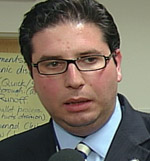A month prior to the Armenian national elections the attention of the American-Armenians was focused on the Glendale elections. In Glendale, the elections were held to elect two out of five members of the city council, who together with three other members are supposed to manage the community on a rotational basis. People were sure that Armenian candidates would be elected, as 50% of the city population is Armenian. Four out of eight candidates were Armenians. One of them was Raffi Manukian, who had already been elected for the same post several times in past. Greg Krikorian was the other candidate most likely to be elected. The other candidates were businessman Shahe Kyureghyan and TV journalist Vrezh Aghajanyan, whose pre-election biography says that he’s the second most influential citizen among the 103 major ones of the city. To the surprise of Armenians, none of the four candidates won. The Jews won. The Armenians justified their failure by the large number of Armenian candidates. As a result, by stealing votes from each other, they opened a green path for the Jews.
These elections perhaps showed the fragmentation of Glendale Armenians. There is no joint community here. Here are several Armenian unions – Hayastan Armenians, Iranian Armenians, Iraqi Armenians, Beirut Armenians (they don’t say Lebanese Armenians because it’s clear if the Armenian is from Lebanon he/she is from Beirut). These elections were remarkable in several other ways. The elections were organized by the secretary of the city council, which is headed by an Armenian, Ardi (Artashes) Kasakhyan. By his initiative, the ballots were issued for the first time in four languages – English, Armenian, Spanish and Korean. The ballots were handed out in advance (it’s worth mentioning that in the Armenian translation the letter §·¦ was not printed and in the Spanish version there were mistakes regarding the translation). And perhaps for the first time in the history of the city, Ardi initiated a post-electoral meeting with the residents of the city and citizens included in the electoral commissions to hear their opinion about the elections held on April 3. The meeting was also attended by the senior advisor of “Hughes Aircraft”, candidate of sciences, Manuela Abrahamyan.
In the US there are two versions for voting, either on election day or, if you are busy, prior to the voting day. The last voting is called “distant voting” (absentee). The interesting thing is that the number of absentee voters was more than the one on the election day. According to Kasakhyan, “the traditional Armenian voters prefer the absentee voting. First it’s more convenient, and secondly part of them don’t speak English very well and are afraid that by showing up at he precincts they might get confused.”
Also, on the April 3 elections, only 25.3% of voters with the right to vote voted. The city council meeting was also interesting because it enabled us to learn lot about the electoral flaws and shortcomings in the US. The citizens were complaining that the voting process has become very difficult because the location of polling stations are being changed all the time and it’s necessary to have those in a fixed location. The residents of Glendale offered to apply the postal voting system and fully entrust the absentee voting process to the city council. The secretary of the city council announced that all the recommendations will be considered and reviewed, and in two months it will be possible to speak about the results. During the April 3 elections, members of the board of trustees were also elected. And Armenians had victories here.

